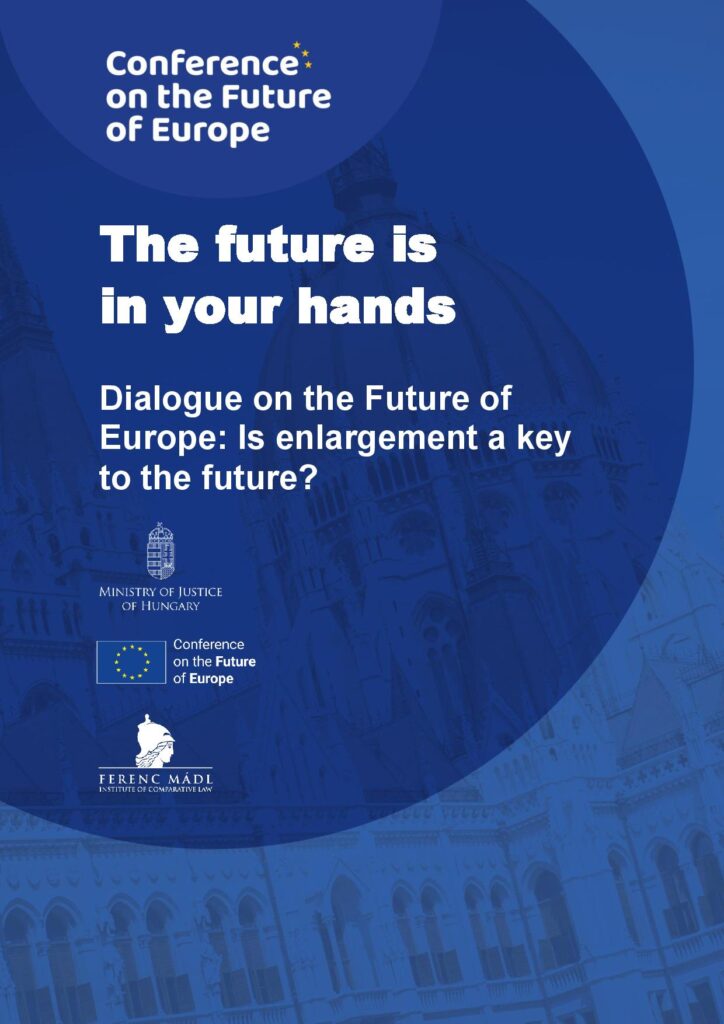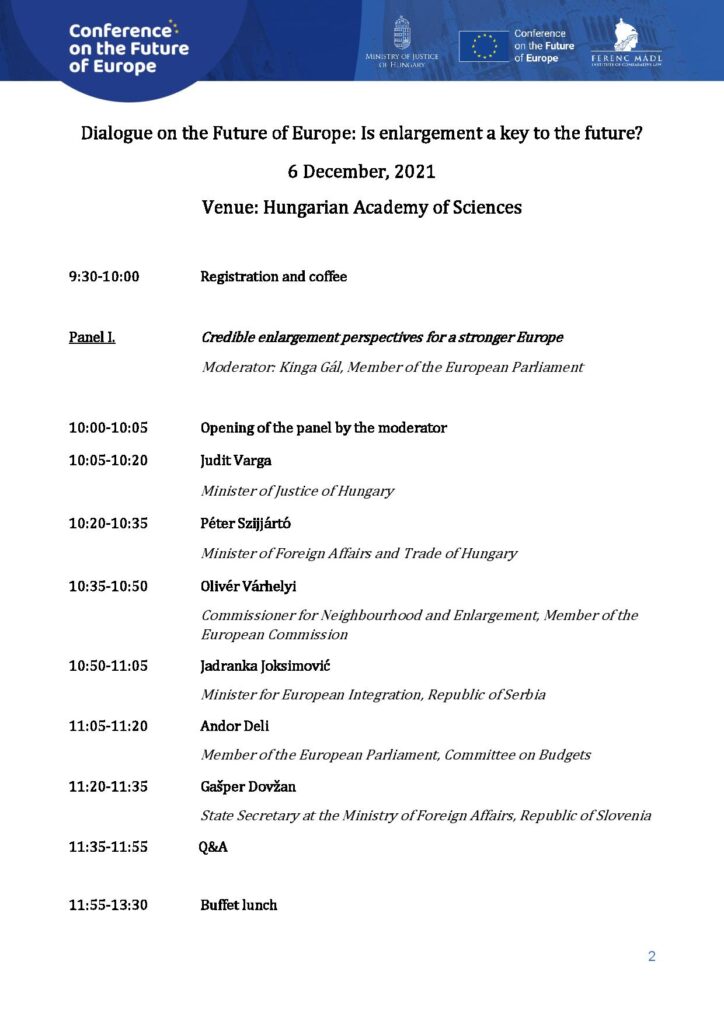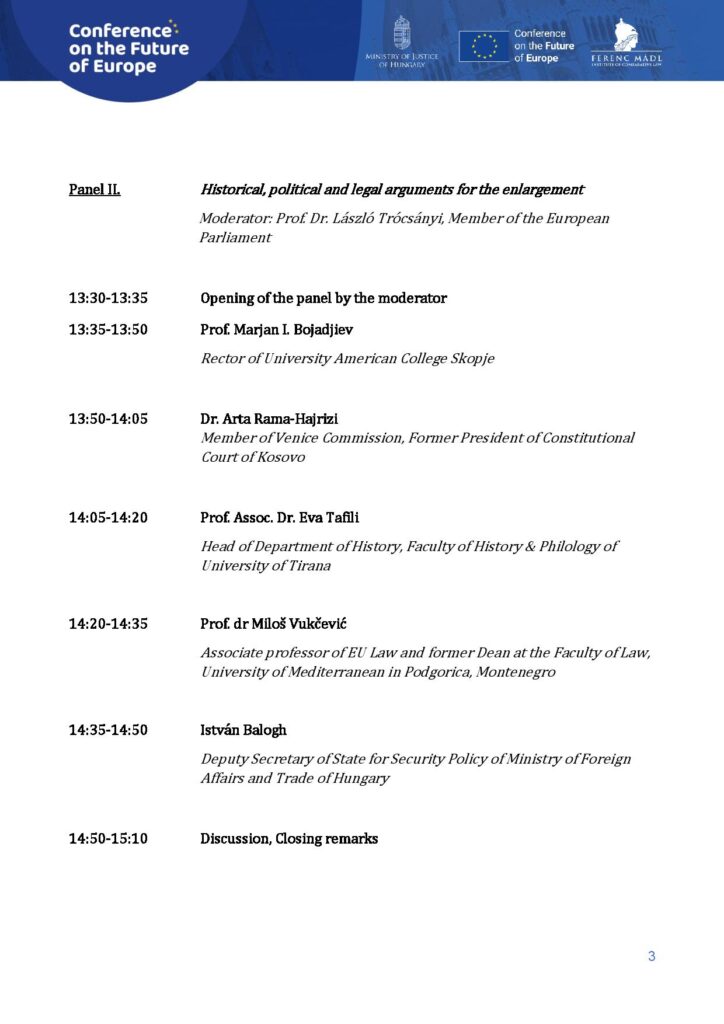The Ministry of Justice and the Ferenc Mádl Institute of Comparative Law organised a high-profile international conference on 06 December 2021 in the context of the Conference on the Future of Europe.
Summary Report
Dialogue on the future of Europe: Is enlargement a key to the future?
- Date and location: 6th of December 2021, Budapest, Hungary
- Number of participants: 100
- Category: Institutional events
- Type of event: on invitation; hybrid (presential and live webstreaming)
- The video coverage of the event is available below and on the following links: https://www.youtube.com/watch?v=K00YpmsZIhI https://www.youtube.com/watch?v=ey8M59cy-Bw
On the 6th of December 2021, the Ministry of Justice and the Mádl Ferenc Institute for Comparative Law have organised a fourth international conference in the framework of the Conference on the future of Europe. The event took place at the Hungarian Academy of Sciences, in Budapest, with approximatively 100 participants, among them ambassadors and other personalities.
The first panel of the conference, titled “Credible enlargement perspectives for a stronger Europe” began with the opening remarks of Minister of Justice Judit Varga. The Minister highlighted that the enlargement is a priority for the Hungarian government. She welcomed that Ursula von der Leyen named the Western-Balkan enlargement as a priority for the Commission as well. Judit Varga underlined that Hungary supports several concrete projects in the region through the International Visegrád Fund. Finally, she recalled that – as Prime Minister Viktor Orbán stated in his seven points on the future of Europe – the Hungarian Government’s position is that the EU needs more that Serbia joins the EU than the EU itself.
Minister of Foreign Affairs and Trade Péter Szijjártó sees the future of the EU in the member states, and not in Brussels. He underlined that the global economic weight of the EU has diminished in the last few years, while our competitors were able to maintain or even increase their share. He criticised the efforts towards stopping internal competition among Member States, because this diminishes the EU’s external competitiveness. Regarding migration, he underlined that only Member States can effectively stop the migration flow, therefore Brussels needs to support them. The minister urged the EU to integrate the Western-Balkans, otherwise, third actors will increase their influence in the region. As he put it: there is no vacuum in geopolitics. Instead of dealing with issues that do not fall under the competence of the EU, EU institutions should focus on issues that are truly common competence, such as enlargement.
Olivér Várhelyi, Commissioner for Neighbourhood and Enlargement underlined that Europe can only become stronger if the Western-Balkans are fully integrated. As for the region, only Europe can provide long-term stability and prosperity. The commissioner mentioned the concrete examples through which the Commission helps the region to advance towards integration, including economical, political and social policies. He also underlined what the region must still accomplish to be allowed accession. He concluded by stating that the enlargement is a beneficial geopolitical investment for both sides.
Jadranka Joksimović, Minister for Integration of Serbia underlined that the accession to EU has no alternative. As the von der Leyen Commission named the enlargement as a priority, it’s the EU’s credibility at stake. It is not an enlargement fatigue that Serbia sees from the EU, but the deliberate cut of previous engagements. Serbia has done all the necessary steps to integration, and they also accepted that the EU has “changed the rules in the middle of the game” with the new accession methodology. The strategic interest of enlargement must be clearly seen from both sides. She also thanked Hungary for their support. She spoke highly of the quality of Hungarian-Serbian relations and of the Hungarian help provided for Serbian integration.
Andor Deli, Hungarian MEP from Vojvodina regretted that enlargement has slowed down. He focused on the nature of enlargement, which has shifted from a highly political question to an administrative one. This is a mistake, and we must return to the true nature of enlargement. European leaders cannot avoid responsibility by the excuse of an overly administrative accession process. In his point of view, Western countries are un-inspired by the region, while China has recognised the business opportunity of the Balkans. He also highlighted that parallel initiatives like the Berlin Process or the Open Balkan are useful, as they are stepping stones towards integration.
Gašper Dovžan, Slovenian Secretary of State also highlighted the question of EU’s credibility, as it did not deliver on its promises. The EU has become too inward-looking, and the enlargement is off the agenda as soon as there is a crisis that arises. This is an error, because enlargement should be treated as a strategic choice. The Conference on the future of Europe offers an opportunity for the first time to a debate in a conference’s framework. The Slovenian Presidency has achieved – also with the support of Hungary – two major wins: the Digital Platform is not geo-blocked, therefore people from the Western-Balkan can also post content; and the ministers of the region were invited to the Conference’s Plenary of October as key stakeholders. In his point of view, one of the biggest dangers of the debate is the tentative to separate European democracy from other levels of democracy. For the future, Europe must find a way to be more robust and resilient, while maintaining internal flexibility.
Following these interventions, the audience could ask questions of the speakers. The Q&A session focused on the importance of regional cooperation, on the role of the Committee of Regions and the EESC, on the unitary V4 position regarding enlargement, and on the Open Balkan Initiative.
Kinga Gál MEP, moderator of the first panel said in her concluding remarks that the enlargement is an unavoidable topic of the future of Europe and the reflexion on the future of Europe must include the Western-Balkans. The Western-Balkans belong to Europe, their accession and their stability is a strategic, economic and security interest for the EU. Therefore, the EU must provide a concrete accession perspective.
The second panel, titled “Historical, political and legal arguments for enlargement” included speakers from the academic field such as Prof. Marjan I. Bojadjiev, Rector of University American College Skopje and Dr. Arta Rama-Hajrizi, Member of Venice Commission, Former President of Constitutional Court of Kosovo, as well as István Balogh, political director of the Hungarian Ministry of Foreign Affairs and Trade.
The experts analysed their countries’ populations’ expectations regarding the accession. They also shared their experiences from the candidate countries’ point of views, and they spoke about the essence of Balkan identity. The post-accession foreign policy to follow, especially towards China, Russia and Turkey was also discussed. László Trócsányi MEP, honorary president of the Mádl Ferenc Institute for Comparative Law and moderator of the second panel mentioned in his conclusions his lack of optimism, especially when pitting the respect of the principle of subsidiarity against the efforts towards European centralisation. He is sure that the French Presidency wishes to modify the Treaties at the end of the Conference on the future of Europe. This can lead to a Europe with the six founding countries at its heart, followed by an outer circle with the other Member States, and a third circle with the Western-Balkans. He underlined that for Hungary, equality between Member States is a key element of European integration, therefore we reject all tentative that goes against this equality.
Recommendations arising from the Conference regarding the future of Europe:
- The strength of Europe is in its Member States, and not in false utopias. Therefore it is time to integrate new Member States.
- Competences must be kept or transferred back to national level in areas where Member States can act in a more effective way. This way, the EU would have time to focus on issues that are truly common competence, like enlargement.
- EU’s responses to crises should not be based on ideologies.
- Illegal immigration can only be stopped by Member States, therefore the EU must support them in this endeavour.
- Propositions that hurt competitiveness (discrimination of nuclear energy, mobility package disadvantaging Central-European freight companies, efforts for tax-harmonisation) must cease.
- The EU must recognise the efforts of candidate countries and must fulfil its engagements regarding the advancement of the accession procedure.
- Accession negotiations must begin without delay with Albania and North-Macedonia, and we must further advance with Serbia and Montenegro, before the end of this year.
- Europe must return to the path of common sense and must admit that strong Member States are not a problem, but part of the solution.
- Brussels must cease its practices leading to alienating Member States.
- The EU can only become stronger, if it fully integrates the Western-Balkans.
- Enlargement is not an administrative, but a political question. We must return to the true political-strategical nature of enlargement.
- We must seek compromises in the EU, and we must always respect the equality of Member States.




